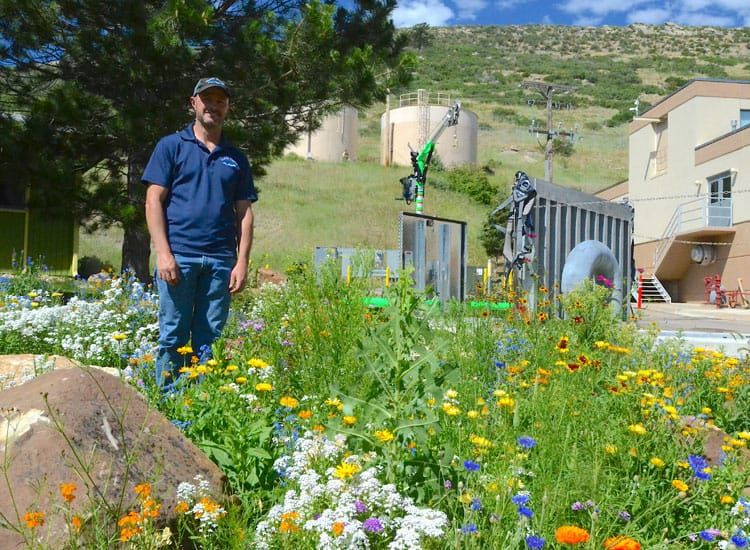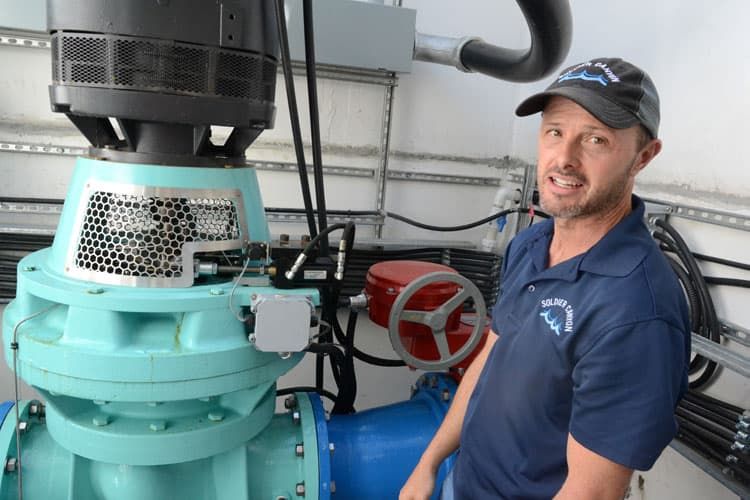Turbine powers treatment plant

It’s not as if Chris Harris needed another reason to boast about the hydro turbine buried beneath his front yard, but the wildflowers are too beautiful to pass up.
Sunflowers taller than toddlers are mixed in with purples, oranges and blues (yes, those are their scientific names), an explosion of color that just so happened to be peaking on a hot July morning, when yet another reporter came out to hear about him talk about the turbine.
The turbine, at least for now, remains the Fort Collins-Loveland Water District’s biggest source of pride, even more than the wildflowers, which are indeed beautiful. The turbine, after all, doesn’t power the flowers — the sun does that — but it makes everything else hum at the Soldier Canyon Water Treatment Plant in north Fort Collins at the base of Horsetooth Reservoir.
SPONSORED CONTENT
People Powered: Preparing Longmont Businesses for Economic Success
Longmont Chamber and FNBO present People Powered on April 24, 2024, aiming to inform business owners about workforce development, housing, and transportation issues.
Harris, the plant manager, lives in a surprisingly homey green house, given that it’s right next to the treatment center (and just to clarify, they don’t treat wastewater at Soldier Canyon, which would diminish his quality of life). He’s even got a little lawn next to all the wildflowers. Other than the occasional beeping from another backing-up truck, it’s a little like paradise.
His job is so important that Harris lives on site, and the turbine, accessed through a ladder that leads to a small concrete space, isn’t far from his front door. The wildflowers remind him of the turbine because the district had to tear up his front yard to install it in June 2018. Harris and his wife sprinkled wildflower seeds on the upturned dirt, and the flowers shot up like fireworks.
The turbine uses the pressure created when water from the Horsetooth Reservoir nearly 100 feet above the pipes comes rushing in to the plant. The turbine harvests all that potential energy, converts it to electricity and powers the plant plus an additional 20 percent that the district sells back to Xcel. Chris Matkins, general manager of the water district, calls that force a “train,” and were the plant allowed to install another turbine, it would be enough to generate four times as much energy to power it. Regulations limit the plant to the 120 percent it generates now.

“It’s the opposite of a pump,” Matkins said. “A pump takes energy to bring water into the plant. This is taking that pressure to create energy.”
Hydro-electric technology has been around since well before you were born, but regulations weren’t worth the time, and, um, energy it took to install the $1.28 million turbine, especially given the cheap cost of fossil energy, Matkins said. The plant could have used it since it began operating in 1962, for instance.
Once those regulations were removed in 2016, the Fort Collins-Loveland district began making plans for the turbine. It celebrated its one-year anniversary in June as one of the first in Colorado. The district provides water to 45,000 people in Fort Collins, Loveland, Timnath, Windsor and unincorporated Larimer County.
There’s zero waste from the project and no emissions, a significant feat given that coal was powering the plant before the district installed the turbine. Matkins said the plant has produced 1,000 megawatts since the turbine was installed. The savings in power costs from the turbine will pay it off in about 15 years in an industry that usually takes 50 years to pay off a project, even with lower rates for customers.
“That’s from a clean energy source,” he said. “That’s something that resonates with our customers.”
The turbine is a part of an exciting era of change for the district, which recently broke ground on a nearly $39 million expansion to Soldier Canyon that will allow the district to provide water to its customers without relying on other plants even during peak summer demands. Soldier Canyon treats water for the district as well as the North Weld County and East Larimer County water districts.
The district’s sewer operations also plan to upgrade its treatment of solid waste so it can be used as fertilizer for lawns and gardens later this year. When that happens, maybe Harris will have another reason to brag about his front yard.
It’s not as if Chris Harris needed another reason to boast about the hydro turbine buried beneath his front yard, but the wildflowers are too beautiful to pass up.
Sunflowers taller than toddlers are mixed in with purples, oranges and blues (yes, those are their scientific names), an explosion of color that just so happened to be peaking on a hot July morning, when yet another reporter came out to hear about him talk about the turbine.
The turbine, at least for now, remains the Fort Collins-Loveland Water District’s biggest source of pride, even more…
THIS ARTICLE IS FOR SUBSCRIBERS ONLY
Continue reading for less than $3 per week!
Get a month of award-winning local business news, trends and insights
Access award-winning content today!

